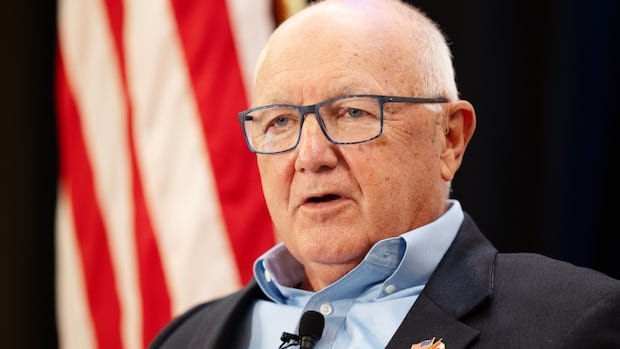The U.S. ambassador to Canada has voiced frustration regarding the prevailing anti-American sentiment in the country, particularly among politicians, following the implementation of tariffs by U.S. President Donald Trump. Pete Hoekstra, the ambassador, expressed his surprise at the sentiments in Canada since assuming his position in April, highlighting a lack of enthusiasm among Canadians for the American-Canadian relationship.
During an event hosted by the Halifax Chamber of Commerce, Hoekstra criticized what he perceived as an anti-American campaign during the Canadian election, stating that it continues to persist, which he finds disappointing. While acknowledging Prime Minister Mark Carney’s recent positive remarks about Canada’s trade relationship with the U.S., Hoekstra criticized a cabinet minister’s characterization of a trade dispute as a “war.”
Finance Minister François-Philippe Champagne’s use of the term “war” in discussions about Canada’s response to Trump’s tariffs was also highlighted. The ongoing challenges faced by sectors such as steel and aluminum due to tariffs were emphasized, prompting the need to explore new markets and industries to strengthen the Canadian economy.
Hoekstra cautioned against using inflammatory language, stating it could be counterproductive. Despite Trump’s rhetoric about annexing Canada to avoid tariffs, Hoekstra previously suggested that such statements could be seen as positive. He defended Trump’s tariff policies by arguing that other countries competing with Canada face higher rates when selling products to the U.S.
Statistics Canada data showed a significant decline in Canadian exports to the U.S. following the tariff announcements, leading to a drop in cross-border travel between the two countries. Hoekstra emphasized ongoing discussions between Trump and Carney on various issues, indicating a potential for positive outcomes in trade negotiations.
He welcomed the removal of retaliatory tariffs on American goods compliant with the CUSMA agreement, describing it as a positive step for trade relations. However, he cautioned that continued boycotts and tariffs could impact feedback from Americans during upcoming public consultations on trade agreements.
The mandatory review process for evaluating the effectiveness of CUSMA over the past five years has commenced, with Hoekstra foreseeing a lengthy and challenging process ahead. He anticipated receiving a mix of feedback from American businesses, with a likely conclusion of the review by July 2026.

